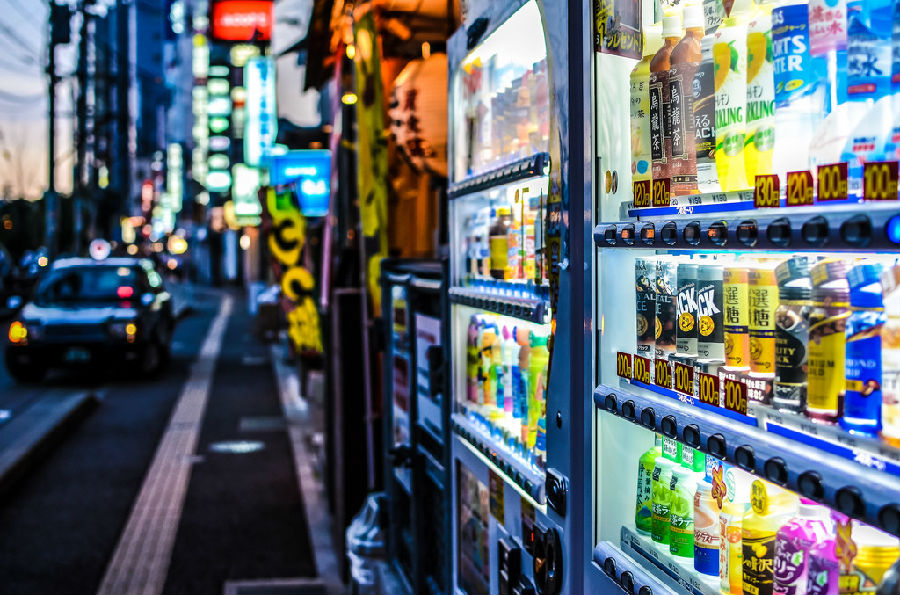There is a vending machine for every 23 people in Japan.
日本平均每23个人就有一台自动售货机。
That's the highest vending machine per capita on the planet.
创下了世界上自动售货机的最高人均水平。
After the business card fiasco, I started to become keenly aware of all the vending machines that I saw here in Japan.
经历了名片的惨败之后,我开始敏锐地意识到,日本有好多好多的自动售货机。
I noticed: they are everywhere!
我注意到,已经多到了无处不在的程度!
Indeed, what we're looking at here is a Japanese institution.
事实上,我们现在看到的是日本的一个地标。
Behind me sits an entire shop dedicated to chopsticks.
而我身后的是一家专门卖筷子的店。
Yes, I'm about to go inside.
是的,我要进去逛逛。
The first thing you have to know in order to understand the vending machines, is that Japan is an aging country.
要理解日本自动售货机为什么会这么多,你首先要知道,日本是一个老龄化国家。
The average age here is 46 years old, which is almost double the world average.
这边的平均年龄是46岁,几乎是世界平均年龄的两倍。
And the fertility rate is 1.4 which means the population is actually shrinking.
而日本的生育率是1.4,这就意味着日本的人口实际上是在减少的。
This is actually a looming crisis for Japan generally, but one of the effects of it is that the labor market is very expensive.
对日本来说,这已经成了迫在眉睫的一个危机,而这个问题带来的一大影响就是劳动力市场变得非常的昂贵。
There's a scarcity of low-skilled labor.
技术含量较低的劳动力少得可怜。
So, instead of paying a sales clerk to sit and collect your money when you buy a piece of gum,
所以,他们选择将口香糖放进机器让整个过程自动化,
they just put it in a machine and automate the whole thing.
而不是付钱给售货员让他坐在那儿收钱。
And the same goes for real estate.
房地产行业也是如此。
Japan is one of the densest countries in the world.
日本是世界上人口密度最大的国家之一。
93 percent of the population lives in cities.
日本的城市人口比例达到了93%。
People literally live in apartment smaller than your SUV.
有的人住的公寓比你的SUV还小。
So instead of paying a lot of money for a store front,
所以,零售商们不再花钱买店面了,
retailers will just slip a little machine into an alleyway to save a lot of money and they can still turn a really good profit.
在巷子里投放一个小机器不仅能省很多钱,还能获得很好的利润。
According to one essay that I read from a Japanese economist here in Tokyo,
根据我看过的东京这边的某位经济学家的一篇文章来看,

the bigger explanation for the vending machines is a fascination or even an obsession with automation and robotics.
自动售货机这个问题更重要的原因是日本人对自动化和机器人的迷恋甚至是痴迷。
Everything that can be automated here, is automated.
这边,凡是能够自动化的东西都一律自动化了。
When I go into order like a ramen or breakfast, more often than not i order on a machine and I give a little ticket to someone.
像点拉面或点早餐,我通常都是在机器上点,再把小票拿给店员。
It's indicative of a broader cultural trend of wanting to automate every system you possibly can.
这也表明使用自动售货机是日本普遍的文化趋势,他们希望自动化一切能自动化的东西。
Every taxi in Tokyo has automated doors that the driver controls.
东京所有出租车的门都是司机控制的自动门。
Now, I don't want to overstate this.
我并不是要夸大事实,
There's still a major appreciation for handcrafted artisanal goods here in Japan.
但日本人对手工制品还是保持着很高的审美要求的。
A good example of this is the seven-year-old coffee shop I just got out of,
一个很好的例子就是我刚出来的那家已经开了7年的咖啡馆,
where they literally use a weighted scale to weigh their coffee beans before grinding them and brewing them to order
他们磨咖啡,冲咖啡之前称咖啡豆用的还是那种老式的天平秤,
To cool down their coffee, they put it into a metal vessel and spin it around a giant ice cube.
给咖啡降温采用的也是把咖啡放到金属罐里,再放到一个大大的冰块上来回翻转的方式。
So yes, they love automation but they're still very much in touch with the handmade.
所以,是的,他们是很喜欢自动化,但他们同时也非常喜欢手工制作。
So another thing that totally contributes is this: coinage.
另一个很重要的因素是:硬币。
So much coinage.
超多超多的硬币。
The one big caveat to the whole automation thing is that they haven't really gotten on board with credit cards yet.
关于日本系统性自动化的一个重要警告是,他们都还没有真正开始使用信用卡。
Everything is cash based.
这些买东西每次都要付现金。
And because of that you always have coinage.
正因为如此,所以你的口袋里总是会有硬币。
One of their highest coin is worth like five dollars and let's be honest:
他们的硬币最大的面值差不多相当于五美元,而且,说实话,
there's nothing more satisfying than unloading some of the change in your pocket into a vending machine for some yummy treat.
没有什么比用口袋里的零钱在自动售货机上买点好吃的更让人心满意足的了。
My personal favorite item is hot green tea comes out wonderfully warm and you just wonder how you got so lucky.
我个人最喜欢的是热腾腾的绿茶,刚拿到手上的时候超级暖和,你不由自主地就会想,你怎么会这么幸运。
So Japan is an aging nation with expensive labor and a love for robots and too many coins in its pocket
总而言之一句话,因为日本是一个老龄化国家,劳动力成本高昂,加上他们热爱机器人,口袋里硬币又太多,才变成了一个遍地都是自动贩卖机的国家。


